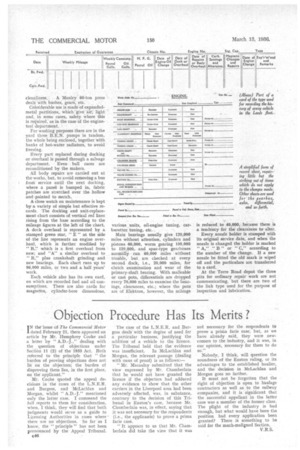Objection Procedure Has Its Merits ?
Page 98

If you've noticed an error in this article please click here to report it so we can fix it.
I N the 'issue of The Commercial Motor dated February 21, there appeared an article by Mr. Humphrey Cooke and a letter by "A.D.-J.." dealing with the question of objections under Section 11 (2) of the 1933 Act. Both referred to the principle that " the burden of proving objections does not lie on the objectors; the burden of disproving them lies, in the first place, on the applicant."
Mr. Cooke quoted the appeal decisions in the cases of the L.N.E.R. and Burgess, and McLachlan and Morgan, whilst "A.D.-J." mentioned only the latter case, I commend the fall reports to them for consideration, when, I think, they will find that both judgments would serve as a guide to Licensing Authorities in cases where there are no objections. So far as I know, the " principle " has not been pronounced by the Appeal Tribunal. The case of the L.N.E.R, and Burgess deals with the degree of need for a particular business, justifying the addition of a vehicle to the licence, The Tribunal held that the evidence was insufficient. In McLachlan and Morgan, the relevant passage (dealing with onus of proof) is as follows:— " Mr. Macaulay submitted that the view expressed by Mr. Chamberlain that he would not have granted the licence if the objectors had adduced any evidence to show that the other carriers in the Liverpool area had been adversely affected, was, in substance, contrary to the decision of this Tribunal in Enston's case, because Mr. Chamberlain was, in effect, saying that it was not necessary for the respondents (i.e., the applicants) to prove a prima facie case.
"It appears to us that Mr. Chamberlain did take the view that it was not necessary for the respondents to prove a prima facie case, but, as we have already said, they were newcomers to the industry, and it was, in our opinion, necessary for them to do so."
Nobody, I think, will question the soundness of the Easton ruling, or its advantages to the established haulier, and the decision in McLachlan and Morgan goes no farther.
It must not be forgotten that the right of objection is open to haulage contractors as well as to the railway companies, and it is significant that the successful appellant in the latter case was a member of the former class. The plight of the industry is bad enough, but what would have been the position bad every application been granted? There is something to be said for the much-maligned Section..


























































































































































